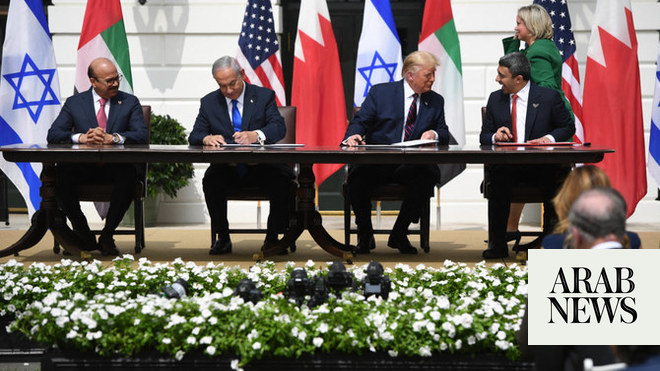
In the Talmudic “Ethics of the Fathers,” compiled almost two millennia ago, Rabbi Tarfon offers us several lessons on the importance of completing the unfinished task. “It is not your duty to finish the work, but neither are you at liberty to neglect it,” he explains. After all, “the day is short, the work is plentiful, the laborers are indolent, the reward is great, and the master of the house is insistent.”
As a rabbi who has devoted decades to Jewish-Muslim rapprochement, and at this High Holidays season of self-examination and introspection, I have returned to these maxims specifically in thinking about the historic but incomplete progress since the signing of the Abraham Accords on the White House South Lawn one year ago on Wednesday.
There is no doubt that the establishment of diplomatic relations between Israel and the Muslim countries of the UAE, Bahrain, Morocco and Sudan has fostered new hope in a region that has known far too much conflict. But even more striking than the government-to-government ties have been the massive explosion in personal relationships and new partnerships built among peoples with no previous contact and little, if any, mutual awareness.
Tens of thousands of Israelis and Emiratis have visited each other’s lands, experiencing for the first time the bustling metropolis of Dubai or the ancient and holy sanctuaries of Al-Haram Al-Sharif. They have created joint funds and tech startups, and shared iftars and seders. Even beyond the UAE, Israeli and Arab ministers and ambassadors have collaborated as never before on investments and security, culture and COVID-19 prevention.
It is impossible to take in even a tiny fraction of this flowering of political and person-to-person exchange without being filled with tremendous optimism for the future. But as Rabbi Tarfon would instruct us, the job is far from done. And no one should be resting on his or her laurels.
There is no doubt that the establishment of diplomatic relations between Israel and the Muslim countries of the UAE, Bahrain, Morocco and Sudan has fostered new hope in a region that has known far too much conflict
Rabbi Marc Schneier
On the Arabian Peninsula, where many of Israel’s immediate neighbors are located, four major holdouts to a new regional partnership exist: Saudi Arabia, the birthplace of Islam and guardian of its two holiest sites, Qatar, a power broker well beyond its borders, Kuwait, and Oman.
This foursome varies greatly in terms of the dynamics of their hydrocarbon-fueled economies, the ways in which they balance centuries-old religious code with the exigencies of modernity, and their postures vis-a-vis other regional forces such as Iran and transnational political Islam.
But they are the same in one critical aspect of great pertinence to Israeli and US security considerations: All four have conditioned an open relationship with Israel on a resolution to the Palestinians’ aspiration for a viable state of their own. I know this is true and not mere posturing because the leadership in each of these countries told me so directly.
Given the decades of intractability between Israelis and Palestinians, such conditioning would normally amount to the end of the conversation. But the Middle East is never as it seems and several factors may augur well for further breakthroughs — provided everyone puts in the work.
For one, we now have an American leader in President Joe Biden who is prioritizing a two-state solution between the Israelis and Palestinians — a long-standing US objective that his predecessor, President Donald Trump, repeatedly equivocated upon. Biden’s determination to advance a real and sustainable Israeli-Palestinian peace hardly makes an agreement a fait accompli. But history has shown us that, when Washington ignores this dispute, any such deal is near-impossible.
With the Biden administration driving the diplomatic process, we could see at the negotiating table an Israeli government more diverse than any in the 73-year-old country’s history, even featuring an Arab political party in its composition.
And while Palestinian politics remain rooted in Hamas’ rejection of Israel’s right to exist and President Mahmoud Abbas’ aversion to any talks that might tear at his already threadbare support among the Palestinian public, the regional desire for an equitable compromise is far stronger today than it was during the failures of the past. The message I have heard not just in Abu Dhabi and Manama, but also Riyadh and Doha, is that everyone wants this conflict resolved honorably and as quickly as possible. And the opportunity afterward will be immense.
So for this one-year anniversary, perhaps a reflection is more appropriate than a celebration. Yes, we can rejoice in the new realm of possibility that the Abraham Accords have cracked open between Israel and its Arab neighbors, and between Jews and Muslims. I have always believed that we as peoples share a common faith and a common fate. In the wake of Rosh Hashanah, let us hope that in this year we share a common resolve to realize a common vision of peace.
• Rabbi Marc Schneier is president of the Foundation for Ethnic Understanding. He is the co-author with Imam Shamsi Ali of “Sons of Abraham: A Candid Conversation About the Issues that Divide and Unite Muslims and Jews.”
Disclaimer: Views expressed by writers in this section are their own and do not necessarily reflect Arab News" point-of-view











